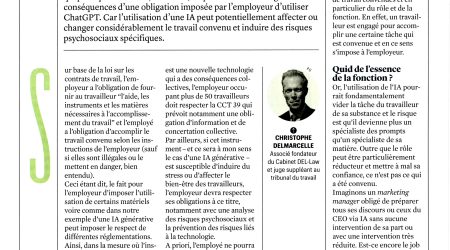Bad weather has severely affected many Belgians. It's time for employers to remember that they can help workers by granting them a tax and social security-exempt benefit (Trends, 29-7-2021)
Posted the 27 September 2021Certainly, insurance will often step in, but coverage will not always be complete. Even if we can expect files to be handled quickly, people still need to live in the meantime.
Aid is being organized, and many companies have stepped in directly, like Lhoist, whose equipment was used in rescue operations. Others have made premises available for their workers or organized emergency collections.
This is the moment to remember that, under exceptional circumstances, an employer can grant a benefit to help an employee, whether through a cash payment or a donation in kind.
From a social security perspective, remuneration is defined as wages in cash and benefits in kind “to which the worker is entitled as a result of their employment” (cf. Article 2 of the law of April 12, 1965).
From a tax perspective, remuneration encompasses all direct or indirect income resulting from employment, such as wages, salaries, bonuses, gratuities, and other similar payments, as well as benefits in kind related to or arising from professional activity (cf. Articles 30 and 31 CIR 1992).
Therefore, as confirmed by the Court of Cassation, a benefit granted by an employer on special occasions—such as a personal expression of sympathy or consideration or a specific private or family event in the worker's life, and not as compensation for work—is not considered remuneration under the law.
Such a gratuity must not be work-related, must not arise from any legal or contractual obligation or even company practice, must be linked to a specific and exceptional event in the worker's life, and must be granted voluntarily.
Providing an exceptional gratuity to workers affected by the weather conditions to help them navigate these difficult circumstances can certainly qualify as a tax- and social security-exempt benefit. This applies regardless of whether it involves cash or goods or the value of the gratuity, provided it does not replace a normal component of remuneration (e.g., a bonus).
The NSSO explicitly mentions in its employer instructions the example of a gratuity given to a worker following significant damage caused by a fire at their home.
It should be noted that such a gratuity does not need to be included on payroll slips or tax forms but must be recorded as non-deductible expenses.
Practically speaking, it is advisable to document such a gratuity, its context, and the employer’s intent in a written document, such as a letter to the worker explaining the reasoning behind the company’s gesture.
Trends, 29-7-2021
Related articles

Is an employer allowed to mandate the use of artificial intelligence tools by employees ? (Trends, 17-07-2025)

Caution if a former colleague opposed to your employer asks you to testify in their favor
